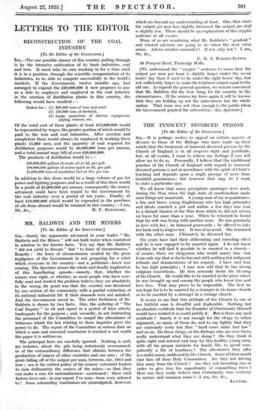THE INNOCENT DIVORCED PERSON
[To the Editor of the SPECTATOR.] SIR,—It is perhaps useless to appeal on certain aspects ot divorce to those of the Bishops who have made up their minds that the treatment of innocent divorced persons by the Church of England is in all respects right and justifiable, but, at all events, I want to relieve my feelings if you will allow me to do so. Personally, I believe that the traditional practice of the Church of England with regard to innocent divorced persons is not in accordance with the spirit of Christ's m teaching and depends upon a single passage of more than doubtful genuineness;' but however that may be I want to state a particular case.
We all know that many precipitate marriages were made during the' War, when the high state of emotionalism made such things not unnatural. A young man of my acquaintance, a fine and brave young Englishman who has high principles and ideals, married a girl and within a few days was sent.. to 'a distant theatre of the War from which he did not return on leave for more than a year. When he returned he found that his wife was living with another man. He was genuinely in love with her ; he behaved generously ; lie offered to take her back and to forgive her. It was of no avail. She remained with the other man. Uitimately he divorced her.
Six years have had their obliterating and consoling effect and he is now engaged to be married again. I do not know whether he will find it possible to be married in a church— of course, there are clergymen who would marry him—but I can only say that so far he has met with nothing but indignant refusals and denunciations of his request. I have said that he has high principles ; I may now add that he has strong religious convictions. He does seriously desire the blessing of his Church. He would like to be married in the place where he was brought up and among the people who know him and love him. That may prove to be impossible. The best he can hope for is to be married by a stranger in his home church or to be married by a stranger in a strange church.
It seems to me that this attitude of the Church to one ot her faithful sons is dreadful and deplorable. Nothing but an absolute certitude that the Founder of Christianity Himself would have wished it so could justify it. But is there any such certitude ? Surely it is not enough for the clergy to refuse argument, as many of them do, and to say lightly that they are extremely sorry but that " hard cases make bad law " and so on. Do these clergy, or the Bishops who are over them, really understand what they are doing ? Do they think it quite right and natural and easy for this healthy young man, with all his proper instincts for family life, to spend com- pulsorily a life of loneliness ? The alternative they offer is a sinful union, unblessed by the Church. Some of them would cast him off from Holy Communion. Are they not driving him away from the Church ? Are they not inventing sins in order to give him the opportunity of committing them ? How can they really believe that Christianity runs contrary to nature and common sense ?—I am, Sir, &c., LAYMAN. •


































 Previous page
Previous page